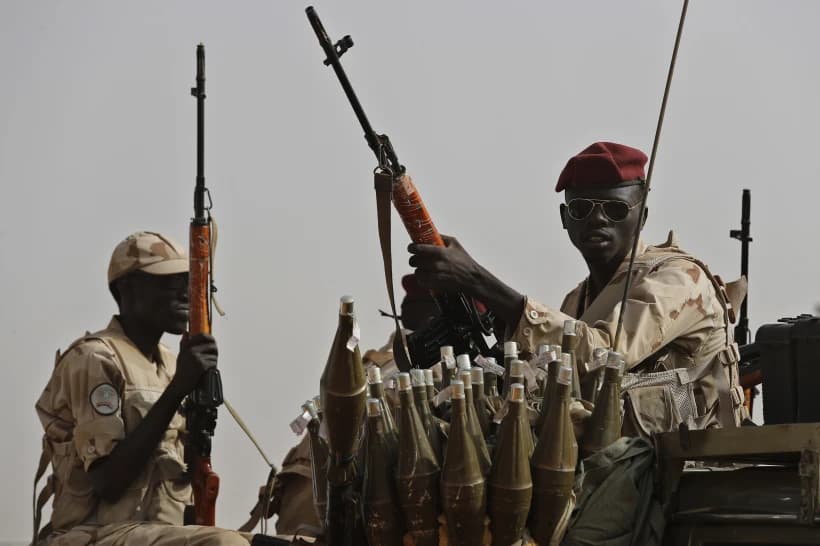LEICESTER, United Kingdom – After more than 15 months of war in Sudan, a famine has been officially declared in a large displacement camp in the North Darfur region.
Kayode Akintola, Head of Region for Africa for CAFOD – the international aid agency of the Catholic Bishops Conference of England and Wales – said if nothing changes, “countless other communities across Sudan will starve to death amidst the world’s indifference.”
Fighting broke out between two rival armed factions in the capital in April 2023. The Sudanese Armed Forces (SAF) led by General Abdel Fattah al-Burhan and the powerful paramilitary group known as the Rapid Support Forces (RSF) led by Mohamed Hamdan “Hemedti” Dagalo began fighting over the control of the state and its resources.
According to the Center for Preventive Action, the civil war has so far triggered the deaths of almost 15,000 people. More than 8.2 million have been displaced, about 2 million of the displaced finding refuge in equally volatile environments like Chad, South Sudan and Ethiopia.
RELATED: Bishop says food is being used as a weapon in Sudan
The Famine Review Committee (FRC) – the most prominent international agency looking at famine – says there is famine in Zamzam camp, is the first determination of famine by the Committee in more than 7 years, and only the third since the monitoring system was created 20 years ago.
Experts say the Darfur and Kordofan regions in Sudan have seen a huge fall food production, leading to food insecurity. In addition, military groups often attack crops and loot food warehouses in these regions.
Akintola noted the situation in Zamzam is the only one that the IPC could independently verify, “but the lack of data hides the true extent of this crisis.”
“The international community has failed to prevent a foreseeable tragedy in Sudan, marked by apathy and an inadequate humanitarian response,” the CAFOD official said.
“Only a third of the required funding has been met, and efficient solutions like cash assistance remain underfunded. If nothing changes, countless other communities across Sudan will starve to death amidst the world’s indifference,” he said.
The FRC said the scale of devastation brought by the escalating violence in el-Fasher has ballooned since April and is “profound and harrowing.”
“The main drivers of famine in Zamzam camp are conflict and lack of humanitarian access, both of which can immediately be rectified with the necessary political will,” the FRC said.
In his statement from CAFOD, Akintola said supply routes to the White Nile state are cut off, affecting internally displaced people, refugees, and host communities.
RELATED: Amid Sudan’s raging conflict, faith keeps a Catholic community alive
“The shortage of food and fuel means White Nile state could soon face famine where CAFOD is on the ground. We are working with partners to provide urgently needed cash voucher assistance for food, water and other necessities,” he added.
“To end this crisis, we urge the implementation of the Famine Review Committee’s recommendations, the cessation of attacks on civilians, and the opening of humanitarian corridors. The international community must also scale up efforts to end hostilities and ensure transparent, rapid funding to local responders and mutual aid initiatives,” the CAFOD official added.
The UN World Food Program (WFP) Executive Director said they “urgently need” a massive expansion of humanitarian access so they can halt the famine that has taken hold in North Darfur and stop it sweeping across Sudan.
“The warring parties must lift all restrictions and open new supply routes across borders, and across conflict lines, so relief agencies can get to cut-off communities with desperately needed food and other humanitarian aid,” said Cindy McCain.
“I also call on the international community to act now to secure a ceasefire in this brutal conflict and end Sudan’s slide into famine. It is the only way we will reverse a humanitarian catastrophe that is destabilizing this entire region of Africa,” she added.
Akintola said to address the crisis in Sudan, the parties in the conflict must halt attacks on civilians, open important crossings, create humanitarian corridors, ease bureaucratic procedures, and ensure safe commercial supply routes.
“The humanitarian community should prioritize cash assistance, increase funding to local actors, and enhance coordination efforts. The international community must reconvene to scale up humanitarian response, ensure unfettered access, and urgently disperse pledged funds,” the CAFOD official said.
Follow Charles Collins on X: @CharlesinRome















